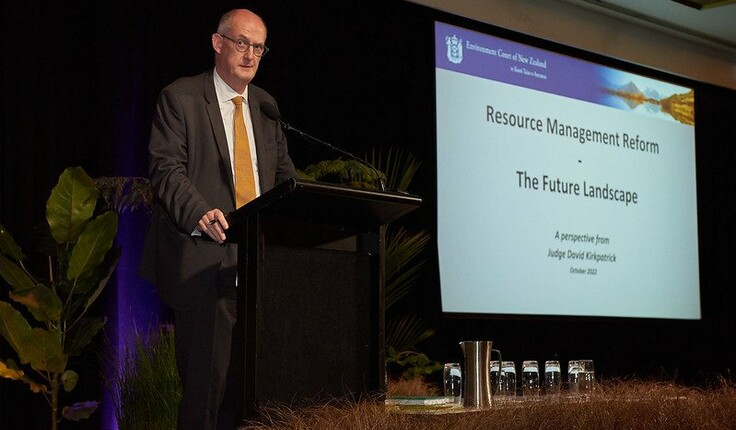News
Chief Environment Court Judge David Kirkpatrick
Posted 16 01 2023
in News

Watch Video
Delegates at the 2022 NZILA Firth Conference in October got the rare opportunity to hear from an environment court judge.
Chief Environment Court Judge David Kirkpatrick began his presentation with a disclaimer saying that as the Resource Management Act is being replaced and the new legislation is the subject of work being done by the Minister for the Environment it wouldn’t have been appropriate for him as a judge to “trespass on the work being done by ministers of the Crown or the work being done by the Legislature.”
Instead, said Judge Kirkpatrick, his presentation would draw on observations gained through his work in the resource management field to look at the framework for adjudicating disputes and consent processing options “which I suspect is probably going to be the main difference in terms of the new legislation, the Natural and Built Environments Act.”
“The minister has stated that his aims are to better protect and restore the natural environment, to provide clear national direction on biophysical limits through a national planning framework and regional spatial strategies to resolve conflicts and to provide an adequate budget, which will be a great thing should that happen.”
But, he said, the devil is in the detail “including whether or not any close but different wording is used in the statute compared to what we've been using for the past 30 years. “
He points out that “we survived a major transition in 1991. We did spend quite a lot of time referring to non complying activities of specified departures. Those of you who were involved in giving evidence or participating under the Town and Country Planning Act will know that that was quite wrong. And whether or not we continue doing that with the new legislation, I'd like to think that we can engage with it as it stands rather than attempt to interpret it in terms of old legislation.”
He told delegates he is concerned the Minister and the Ministry are trying to clear out references to “qualitative factors in the assessment of proposals, either plan proposals or consent proposals, in particular the phrase amenity values, possibly also the quality of the environment.
“I'm told that amenity values is to be removed because it represents privilege. Indeed, I think that the people who first brought town planning into the legislative field and I'm thinking about reformers like Peel in England in the Industrial Revolution, would be quite shocked to think that amenity values only relates to privilege. And I'm a bit concerned that there's been a failure of definition, possibly a failure of definition in the legislation, possibly a failure by lawyers and judges who deal with words, possibly a failure by those who attempt to give evidence about what the facts of amenity values are. But that is something that we might all keep an eye on when it comes out.“
He then moved to the second act; The Strategic Planning Act. “I understand that the purpose of separating this out in a separate act is to give it more emphasis. And I was happy about that until I was asked the question; do we really need to do the spatial strategies before we develop the plans?
Judge Kirkpatrick then turned attention on the Climate Change Adaptation Act. “I suppose my question is, should climate change adaptation be separate from the rest of the regime or should it be integral to it? Should it be fundamental to it?” he asked.
“I suppose I'm just a little bit concerned that the policy in New Zealand, ever since we began legislating about climate change issues, has been that the participatory framework of our planning has not been applied for climate change. Maybe that's because our leaders are fearful of what might happen if there were a full participatory approach. On the other hand, I'm not sure that we've had terribly many specifics at a higher level about how we should be dealing with those things. There are had issues under climate change. Managed retreat is only one of them. There are a whole lot of issues in relation to water that confront us, availability of water for our use, our control of water because of the effects that it can have on our lives.”
He says in terms of hazard management “the one thing that we do know is that the had issues are not made easier by delay. It is important that our planning framework be based on sound principles. Again, there should be a strategic approach rather than the rules. I could speak for a long, long time about law being more based on principles than it is on rules, because I'm afraid that a lot of people would like to jump to the rules first and then try to work backwards. And in my experience, that never works. We need to think about the who, why, where, when, how and what.”
“We need to identify those things at the outset. Again, before we jump to an answer. We need to start with issues in the broader sense. We need to think about our options. We need to consult, which means talking to people before we've decided what it is we're going to do and ask them what they think we ought to do, analyse what we think, analyse what the people we've consulted, think, and then come up with a proposal, monitor, review, repeat, rinse if necessary.”
Judge Kirkpatrick also touched on the role of the Environment Court in Aotearoa New Zealand in a time of change.
“As everybody who's studied town planning knows, communication is ultimately the the source of most of our development. The Roads Boards turned into Town and Country Planning Boards, Town and Country Planning Appeal Board, the Planning Tribunal onto the Environment Court.
“I'm oversensitive, but there's a degree to which my other judicial colleagues in what they like to call the real courts, feel that town planning is still essentially an administrative task and that the main debates that go on about people killing one another, sometimes people collecting money from one another, sometimes those two things overlap that that that's quite a different thing to working out how high a building ought to be or where a road ought to run. I think that when people have disputes, they need a decent, clear, independent dispute resolution service to avoid murder. And and the real difference is that the environment court tends to say, what should we be doing? How should we approach the future as opposed to the murder case, which is who did it or the or the debt collection case, which is who owes the money to who?”
He told delegates that although the Minister has been very clear in his speeches that the Environment Court still has a role to play “ I still remain fearful the role of a judicial decision maker, the third limb of the of the framework for government constitutional legitimacy, which is that the legislature should not interpret its own laws. The executive should not judge its own actions. You should have an independent judiciary who interpret the law and to apply that law to the actions of the executive. We mean to provide case specific rulings in rational or through rational and fair processes. We swear an oath to do justice to all manner of people without fear or favour, affection or ill will. And we are meant to keep ourselves independent from the debates that are going on. “
Judge Kirkpatrick then turned to the subject of tikanga. “The resource management definition of tikanga is Maori customary values and practices. I just don't think that That's right. We need to understand tikanga in the way in which tikanga has developed, which means we have to understand it in the sense in which the people who use that word mean it.”
You can see much more from Judge David Kirkpatrick in his complete conference presentation video below.
12 Feb
NZILA lodges submission on Planning Bill and Natural Environment Bill

There’s still time to have your say
Tuia Pito Ora New Zealand Institute of Landscape Architects has lodged its formal submission on the Planning Bill and Natural …
09 Feb
Weekly international landscape, climate and urban design update

Monday 9 February
This is your weekly international snapshot of what’s happening across landscape architecture, climate adaptation and urban design. Drawing on credible …
02 Feb
RMA Reform submission update

Call for feedback and images
Submission framework The Environmental Legislation Working Group thanks all members who made the effort to join us at the national …
Events calendar
Full 2026 calendar